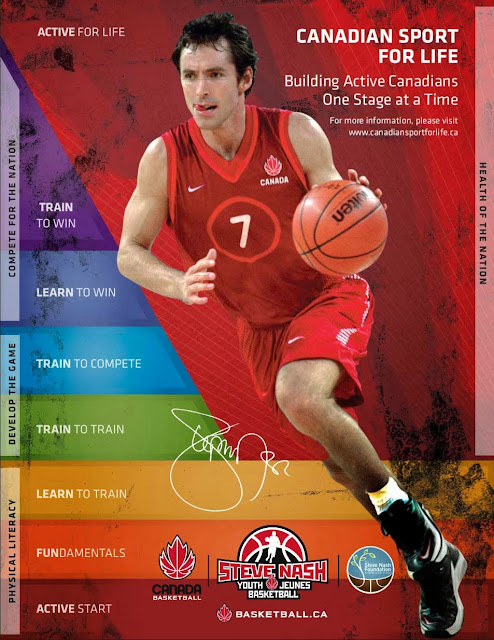Playground to Podium
Planning for the sporting excellence and well-being of Canadians.
The 7-stage Canadian model of Long-Term Athlete Development (LTAD) is a training, competition, and recovery program based on developmental age - the maturation level of an individual - rather than chronological age.It is athlete centered, coach driven, and administration, sport science, and sponsor supported. Athletes who progress through LTAD experience training and competition in programs that consider their biological and training ages in creating periodized plans specific to their development needs.
- Based on the physical, mental, emotional, and cognitive development of children and adolescents. Each stage reflects a different point in athlete development.
- Ensures physical literacy[1] upon which excellence can be built and builds physical literacy in all children, from early childhood to late adolescence by promoting quality daily physical activity in the schools and a common approach to developing physical abilities through community recreation and elite sport programs and recognizes the need to involve all Canadians in LTAD, including athletes with a disability.
- Ensures that optimal training, competition, and recovery programs are provided throughout an athlete’s career. provides an optimal competition structure for the various stages of an athlete’s development.
- Provides an optimal competition structure for the various stages of an athlete's development.
- Has an impact on the entire sport continuum, including participants, parents, coaches, schools, clubs, community recreation programs, provincial sport organizations (Basketball Manitoba), national sport organizations (Canada Basketball), sport science specialists, municipalities, and several government ministries and departments (particularly but not exclusively in the portfolios of health and education) at the provincial/territorial and federal levels.
- Integrates elite sport, community sport and recreation, scholastic sport, and physical education in schools.
- ‘Made in Canada’, recognizing international best practices, research, and normative data.
- Supports the four goals of the Canadian Sport Policy — Enhanced Participation, Enhanced Excellence, Enhanced Capacity, and Enhanced Interaction — and reflects a commitment to contribute to the achievement of these goals.
- Promotes a healthy, physically literate nation whose citizens participate in lifelong physical activity.
Parents - Read the LTAD for Parent Guide
 Canada Basketball Long-Term Athlete Development Model
Canada Basketball Long-Term Athlete Development Model The Canada Basketball Long-Term Athlete Development Model provides a consistent framework from which coaches can work. This document has been designed with the input of sport scientists and coaches from across the country. It is a long-term player/athlete development model that illustrates to coaches, parents, volunteers and administrators at the local, provincial and national levels, the importance of a systematic and consistent approach to the development of athletes. It also recognizes the importance of participation in securing the health of the nation.
DOWNLOAD DOCUMENT
Developing Young Athletes for the Long Term Article
"Physical Literacy" serves as the foundation for not only participation in sport, but also for lifelong participation in physical activities and recreation.Canadian Sport for Life (CS4L) and the Long Term Athlete Development Plan (LTAD) recognize physical literacy as the foundation for developing the skills, knowledge, and attitudes needed for Canadians to lead healthy active lives. The CS4L - LTAD define physical literacy as: "...the development of fundamental movement skills and fundamental sport skills that permit a child to move confidently and with control, in a wide range of physical activity, rhythmic (dance) and sport situations".
CS4L - LTAD promotes physical activity for all based upon a developmental progression. By encouraging a positive physical activity experience at a young age through active play and games (i.e., Active Start) and fostering the development of a variety of well-structured activities that develop basic skills (i.e., FUNdamentals), children begin to develop the physical literacy skills that will enable them to move with poise and confidence across and within a wide variety of physical activities.These basic skills then form a solid platform to learn overall sport skills which can be transferred across a number of different types of sports in the Learning to Train phase. By the time adolescents (12 – 16 yrs for Males / 11 – 15 yrs for Females) reach the Train to Train stage, they are ready to consolidate their basic sport-specific skills and tactics into more specialized forms of physical activity. For those who choose to remain in the competitive stream and have developed a high level of ability, athletes can then specialize in one sport and Train to Compete and subsequently Train to Win at major national and international competitions.
Quality physical education programs can play an important role to support the CS4L where students develop the physical literacy skills that are necessary for the Active Start, Fundamental, Learning to Train, Training to Train and Active Life stages.Quality programs will also provide a solid foundation for students and provides further support for those who wish to continue into the Train to Compete and Train to Win stages.
In an era where physical literacy programs have become a priority for provincial Ministries of Education, National and Provincial Sport Organizations and many Community and grassroots recreation programs across Canada, it is vital for the various partners in sport, education and recreation to demonstrate their collective roles in helping to foster strong literacy skills for children now and into the future.
By fostering physical literacy children continually develop the motivation and ability to understand, communicate, apply, and analyze different forms of movement. They will learn and be able to demonstrate a variety of movements confidently, competently, creatively and strategically across a wide range of health-related physical activities. These abilities enable individuals to make healthy, active choices throughout their life span that are both beneficial to and respectful of themselves and others.
Additional and more detailed information is available by accessing the Canadian Sport For Life LTAD web site at: www.canadiansportforlife.ca








